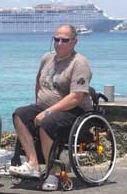Guest Writer
Guest Writer's Latest Posts

UK courts under threat in £1bn Justice budget cuts
 (The Daily Mail): Frontline legal services could be axed following massive cuts in Ministry of Justice funding outlined in a secret Government memo. The document, by the MoJ’s finance department, reveals it will slash £102million from the Court Service budget over the next three years. The memo also details a £193million cut in legal aid and a £39million drop in the Tribunals Service budget by 2011 following this year’s Comprehensive Spending Review. Critics warn the move would inevitably hit public access to justice and could create delays in criminal prosecutions and a wide range of civil disputes. And sources claim MoJ officials are already discussing where the cuts will fall. It is understood that up to 150 courts and tribunals, in five regions, could be forced to merge or close. Gary Slapper, professor of law at the Open University, said: "This will significantly compromise people’s ability to receive justice."
(The Daily Mail): Frontline legal services could be axed following massive cuts in Ministry of Justice funding outlined in a secret Government memo. The document, by the MoJ’s finance department, reveals it will slash £102million from the Court Service budget over the next three years. The memo also details a £193million cut in legal aid and a £39million drop in the Tribunals Service budget by 2011 following this year’s Comprehensive Spending Review. Critics warn the move would inevitably hit public access to justice and could create delays in criminal prosecutions and a wide range of civil disputes. And sources claim MoJ officials are already discussing where the cuts will fall. It is understood that up to 150 courts and tribunals, in five regions, could be forced to merge or close. Gary Slapper, professor of law at the Open University, said: "This will significantly compromise people’s ability to receive justice."

Diving therapy group visit Grand Cayman
 (The Scotsman): Last week a group of three British soldiers, two of them amputees, joined four US marines similarly wounded for an extraordinary diving trip in Grand Cayman, spearheaded by a Scottish diver who has experienced at first hand the despair of the newly disabled. Fraser Bathgate, the pioneer of Deptherapy, as the rehabilitation programme is called, explains: "It is impossible to imagine the emotion of being with these wounded soldiers when they experience for the first time the freedom of being in warm, clear waters and the stunning underwater marine world. I have seen men who were shadows of their former selves become alive again." It is a journey Bathgate was forced to embark upon aged 23 when he slipped off a training wall in London while preparing for a Himalayan climbing expedition.
(The Scotsman): Last week a group of three British soldiers, two of them amputees, joined four US marines similarly wounded for an extraordinary diving trip in Grand Cayman, spearheaded by a Scottish diver who has experienced at first hand the despair of the newly disabled. Fraser Bathgate, the pioneer of Deptherapy, as the rehabilitation programme is called, explains: "It is impossible to imagine the emotion of being with these wounded soldiers when they experience for the first time the freedom of being in warm, clear waters and the stunning underwater marine world. I have seen men who were shadows of their former selves become alive again." It is a journey Bathgate was forced to embark upon aged 23 when he slipped off a training wall in London while preparing for a Himalayan climbing expedition.

Jamaican police weed out bad apples
 (Jamaica Gleaner): One hundred and forty-nine rogue cops have been removed from the Jamaica Constabulary Force (JCF) in the first seven months of this year, an indication that the police anti-corruption arm has stepped up efforts to weed out bad apples. Assistant Commissioner of Police Justin Felice (left), who is in charge of the Anti-Corruption Branch, said this was an increase over the number recorded for the corresponding period last year. A breakdown of police statistics released yesterday shows that 105 cops were barred from re-enlisting at the end of their old contracts, 26 were retired in the public interest, while 18 were dismissed for corruption-related matters.
(Jamaica Gleaner): One hundred and forty-nine rogue cops have been removed from the Jamaica Constabulary Force (JCF) in the first seven months of this year, an indication that the police anti-corruption arm has stepped up efforts to weed out bad apples. Assistant Commissioner of Police Justin Felice (left), who is in charge of the Anti-Corruption Branch, said this was an increase over the number recorded for the corresponding period last year. A breakdown of police statistics released yesterday shows that 105 cops were barred from re-enlisting at the end of their old contracts, 26 were retired in the public interest, while 18 were dismissed for corruption-related matters.

Our new dawn
The Cayman economic explosion began in the late seventies when, simultaneously, banking, tourism and development (construction) began to grow at such a rapid pace our inability to supply the high demand for labour for these industries became a threat. New immigration
legislation and the “Protection Board” were introduced and the economic pull factor facilitated the rest creating a fourth industry, Labour Trade.
Very quickly, the land scarcity was identified and George Town and Seven Mile Beach became the commercial zones for banking and tourism. However, labour also needed housing and the property in West Bay was soon sold to facilitate this. Caymanian land ownership began to shrink
as the indigenous population exchanged the land for cash, slowing only as a result of the uncertainty as it related to the work permit holders ability to obtain citizenship. By the late eighties, few prominent Caymanians remained as major land owners, those remaining were in Savannah, Bodden Town, North Side and East End.
At the turn of the century, the multicultural social issues were at a boiling point and nearing eruption, not only locally but also from the UK as they proceeded to issue a “White Paper” outlining a range of discussion topics, including the advancement of our constitution,
citizenship for work permit holders, a conservation bill and sustainable development. No longer would we be allowed to sit back and ignore these pressing issues. If we failed to act, the UK would act for us by order in Cabinet.
And so, one year after the 2000 election there was political instability for the second time in our history and political parties were introduced as a result. Additionally, during this period, persons
who had been working and living in the country for extended periods were granted status by Cabinet, causing the multicultural social issues to erupt.
This brings me to the point of this paper.
It is now ten years following the mass status grants and large portions of the Savannah and Bodden Town properties have also been sold. Major housing projects developed to provide home ownership to not only the “new” Caymanian, but also to the decedents of Caymanians
who had sold their land three decades previously. The great “new” social change came from within as citizens relocated in masses to these new homes, bringing cultures from around the island and around the world. No longer were Caymanians relocated to a parcel of land up
or down the street, they were relocating to other districts, primarily, the district of Bodden Town, which has seen and continues to experience unsustainable growth. All of the residents of this district saw their lives turned upside down and viewed the “other” people as strangers.
Sadly, the entire social infrastructure was ill prepared and unable to manage the growth and culture shock, so rather than creating the communities we were all accustom to, we created new communities of strangers. To this day, very few have attempted to address these social issues. Politicians, through their “new” parties, are utilizing their national reach to win support from the new citizen in their constituency. Churches found it difficult to integrate the new citizen and the new citizen longed for the comfort of the church they grew up in. Teachers in schools saw the culture of their schools change overnight as the many varying cultures demanded prominence, lacking the tools to cope; they did what most human beings do under those conditions — some ran away and some shut themselves down.
Of course, when there is instability, the blame game is central to causing further social disruption, and so the “strangers” proceeded to blame each other for the ills they faced. And no one benefited.
What was missing from the new communities? Remember when we were growing up everyone in your neighborhood was our friend? Your parents’ friend? Family? When your parents trusted your neighbor to watch, love and discipline you? When parents got together regularly to “gossip”?
That is what the relocation of the masses caused to be removed from their social order.
It is now time for this country to recognize ALL its citizens.
If we fail or refuse to embrace our neighbor as family, regardless of his/her racial background, we will never advance economically, socially and academically. It is time for us to put the “foreigner”
debate behind us, embrace status holders as Caymanians and respect the contribution of work permit holders. We must not simply become more dependent on each other, we must commit to supporting each other. It is impossible to legislate this and foolish to expect political leadership to direct it.
I believe that the greatest social injustice is the resentment and hatred passed onto children from parents towards others. While the relocation of many occurred very quickly, the reestablishment of the “Caymanian Community” will take time and is best vested in the hands of the children who require guidance from their parents. Now, can the parents learn to never spew words of hatred towards their neighbor in the presence of their children?
It is a new dawn and we must write the new chapter of our history with pride.

Net neutrality talks stall in US
 (BBC): US regulators have halted closed-door meetings intended to find a way to make sure all web data is treated equally. The Federal Communications Commission began the meetings after a court limited its net regulation powers. The FCC faced criticism over the meetings by groups that supported the principle known as net neutrality. The FCC decision follows reports that Google and Verizon hatched a separate deal to allow faster speeds for web sites that pay for the privilege. "Any outcome, any deal that doesn’t preserve the freedom and openness of the internet for consumers and entrepreneurs will be unacceptable," said FCC chair Julius Genachowski.
(BBC): US regulators have halted closed-door meetings intended to find a way to make sure all web data is treated equally. The Federal Communications Commission began the meetings after a court limited its net regulation powers. The FCC faced criticism over the meetings by groups that supported the principle known as net neutrality. The FCC decision follows reports that Google and Verizon hatched a separate deal to allow faster speeds for web sites that pay for the privilege. "Any outcome, any deal that doesn’t preserve the freedom and openness of the internet for consumers and entrepreneurs will be unacceptable," said FCC chair Julius Genachowski.

Fidel Castro set to address Cuba national assembly
 (BBC): The former Cuban president, Fidel Castro, is expected to address the national assembly this weekend for the first time in four years. Cuban state media said a special session of the assembly on international affairs, requested by Mr Castro, would be held on Saturday. Fidel Castro, 83, ceded power to his brother Raul in 2006 after falling ill. But he now says he has fully recovered and has made frequent public appearances over the past month. The official announcement of the special parliamentary session does not mention Mr Castro by name, or say who will be speaking. In recent speeches Fidel Castro has warned against what he sees as the danger of imminent nuclear war involving the United States, Israel, Iran and North Korea.
(BBC): The former Cuban president, Fidel Castro, is expected to address the national assembly this weekend for the first time in four years. Cuban state media said a special session of the assembly on international affairs, requested by Mr Castro, would be held on Saturday. Fidel Castro, 83, ceded power to his brother Raul in 2006 after falling ill. But he now says he has fully recovered and has made frequent public appearances over the past month. The official announcement of the special parliamentary session does not mention Mr Castro by name, or say who will be speaking. In recent speeches Fidel Castro has warned against what he sees as the danger of imminent nuclear war involving the United States, Israel, Iran and North Korea.

Scientists plumb depths to ask how many fish in the sea
 (The Guardian): It has been the biggest and most comprehensive attempt ever to answer that age-old question – how many fish are there in the sea? Published today, a 10-year study of the diversity, distribution and abundance of life in the world’s oceans attempts just that. The Census of Marine Life, which hopes to paint a baseline of marine life, estimates there are more than 230,000 species in our oceans. A team of more than 360 scientists around the world have spent the past decade surveying 25 regions, from the Antarctic through the temperate and tropicalseas to the Arctic to count the different types of plants and animals.
(The Guardian): It has been the biggest and most comprehensive attempt ever to answer that age-old question – how many fish are there in the sea? Published today, a 10-year study of the diversity, distribution and abundance of life in the world’s oceans attempts just that. The Census of Marine Life, which hopes to paint a baseline of marine life, estimates there are more than 230,000 species in our oceans. A team of more than 360 scientists around the world have spent the past decade surveying 25 regions, from the Antarctic through the temperate and tropicalseas to the Arctic to count the different types of plants and animals.

Fit heart can slow brain ageing, US researchers say
 (BBC): Keeping your heart fit and strong can slow down the ageing of your brain, US researchers say. A Boston University team found healthy people with sluggish hearts that pumped out less blood had "older" brains on scans than others. Out of the 1,500 people studied, the team observed that the brain shrinks as it ages. A poor cardiac output aged the brain by nearly two years on average, Circulation journal says. The link was seen in younger people in their 30s who did not have heart disease, as well as elderly people who did. The participants with smaller brain volumes on magnetic resonance imaging did not show obvious clinical signs of reduced brain function.
(BBC): Keeping your heart fit and strong can slow down the ageing of your brain, US researchers say. A Boston University team found healthy people with sluggish hearts that pumped out less blood had "older" brains on scans than others. Out of the 1,500 people studied, the team observed that the brain shrinks as it ages. A poor cardiac output aged the brain by nearly two years on average, Circulation journal says. The link was seen in younger people in their 30s who did not have heart disease, as well as elderly people who did. The participants with smaller brain volumes on magnetic resonance imaging did not show obvious clinical signs of reduced brain function.

Reflections on the Round Table on Gambling
I was privileged to be among the small audience that supported the round table discussion on gambling, sponsored by Generation Now, which was held last evening (July 29th) at UCCI. Aside from the awful acoustics, which made it difficult for both panellists and audience to clearly hear what was being said, it was an evening well-spent. It was one of those occasions that offered more light than heat, for a change.
All panellists appeared to have done their homework, at least sufficiently to support their positions, but I was especially impressed with the arguments of Dr. Frank McField (whose position I do not support) and Mr. Billy Adam. They gave the evening the spark that was needed to hold our focus.
Dr. Frank, in reflecting on the question as to whether Christians are right in opposing gambling on moral grounds, rightly stated that moralconvictions change. Consider slavery, for example (my example, not his). It thrived for hundreds of years because the church and society in general saw nothing morally wrong with it. Yet it was because the church and society changed their moral stance on slavery that it was eventually abolished.
Dr. Frank suggested that what we need is more empirical evidence as to the costs vs. the benefits of gaming in order to make an informed decision. Morality alone was not sufficient grounds to prohibit the legalization of gambling, was his point. But, if I may be permitted to use the example of slavery again, I would remind Dr. Frank (and being the astute man that he is, I’m sure he would see my point) that the abolition of the slave trade by the British parliament was due to the relentless advocacy of William Wilberforce, who used empirical evidence to show that slavery was morally reprehensible. In other words, empirical evidence is not self-serving; it is the ammunition that wins the war, or to use another analogy, the evidence that proves the guilt or innocence of the accused.
Touching also on the worth of empirical evidence, Rev. Nicholas Sykes, responding to the question as to whether a decision could be made on the basis of comparing economic benefits to social costs associated with gambling, rightly stated that the question itself was based on a faulty premise, that one could compare economic benefits to social costs; it would be like comparing apples and oranges, he noted.
As none of the panellists denied that there are ethical or moral issues associated with gambling, I was left wondering exactly what quality or quantity of evidence gambling advocates would need to quell all arguments in their minds. A chance meeting today with another member of last night’s audience shed some light on that for me. It seems that the real answer is money, lots of money. So, in the end, it is all an exercise in situational ethics: gambling may be morally suspect, but if it can inject sufficient money into the Cayman economy, then the ends justify the means—presumably if there is an astounding amount of money then the moral issue totally evaporates.
As I stated, it was a most helpful experience. I am left, however, with the clear conviction that every single panellist was conscious that the subject of gambling has implications beyond economics, that there are considerations in the moral or ethical domains that must be contended with as well. And that being the case, do we want to be the generation that legalizes what is at least morally questionable, only to have it abolished by future generations after it has wreaked havoc on our society?

Facebook and Twitter are turning my mind to mush
(Christian Science Monitor): Facebook is turning my mind to mush and I don’t like it. The IQ drop is palpable, and it’s really beginning to get on my nerves. I’m no Internet critic. Nor am I some dude who’s nostalgic for the romantic bygone era of steam engines and Fatty Arbuckle … Therefore it’s with more than a little regret that I have come to realize that Facebook, Twitter, Tumblr, and any number of other catchily named applications and websites are taking my mind, the ripe fruit of the Wisconsin public school system, and spoiling it like an abandoned banana.
